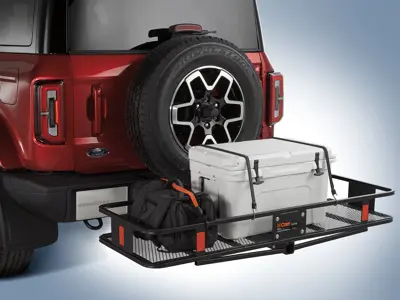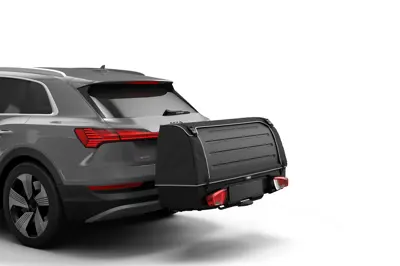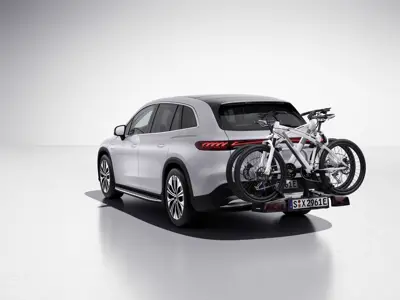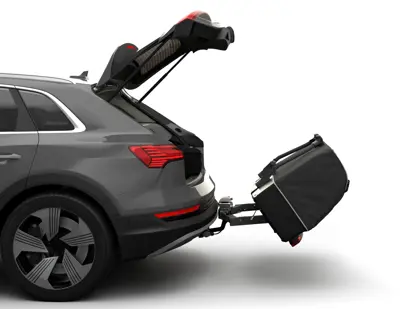Hitch Cargo
If you need to transport extra gear or luggage with your vehicle but don't have enough space inside or on the roof, consider using a hitch cargo carrier.
Last modified: Dec 31, 2024A hitch cargo carrier is a device that attaches to the rear of your vehicle using a trailer hitch, allowing you to carry various items outside your car. Hitch cargo carriers are useful for road trips, camping, moving, or any situation where you need additional cargo capacity. However, they also come with some limitations and challenges. This article will explain the types of hitch cargo carriers, their limitations, and their possibilities.
Types of Hitch Cargo Carriers
Hitch cargo carriers come in various shapes, sizes, materials, and designs. Some of the most common types are:
Basket
A basket-type hitch cargo carrier is a simple and versatile option consisting of a metal frame with a mesh or solid floor. It can hold various items, such as boxes, bags, coolers, or bikes, as long as they are secured with straps, nets, or bungees. A basket-type hitch cargo carrier can also be used with a cargo bag or box to protect the items from weather and theft.
Box
A box-type hitch cargo carrier is a more secure and weather-resistant option with an attached hard-shell or soft-shell container. It can hold various items, such as luggage, camping gear, or sports equipment, and keep them dry and safe from dust, dirt, and theft. A box-type hitch cargo carrier can also be locked with a key or a combination lock for extra security.
Rack
A rack-type hitch cargo carrier is a specialized option consisting of a metal frame with bars, hooks, or slots that can hold specific items, such as bikes, skis, snowboards, or kayaks. It can hold multiple items of the same type and allow easy access and loading. A rack-type hitch cargo carrier can also be used with a hitch adapter or an extension to increase the clearance or capacity.
Limitations of Hitch Cargo Carriers
While hitch cargo carriers offer many benefits, they also have some limitations you must consider before using them:
Compatibility
Not all hitch cargo carriers are compatible with all vehicles or trailer hitches. You need to check the specifications and ratings of both the carrier and the hitch to ensure they match. For example, you need to check the size and class of the hitch receiver, the tongue weight limit, the hitch pinhole location, and the clearance from the bumper. Always consult the vehicle’s manual and the carrier’s instructions for any warnings or restrictions.
Weight Capacity
Hitch cargo carriers have a maximum weight capacity that must be respected to avoid damaging the carrier, hitch, or vehicle. You should also consider the carrier’s weight and the load’s weight distribution. Balance the load evenly and avoid overloading the vehicle’s rear axle. Check the tire pressure and the vehicle’s suspension and adjust them if needed. Typically, the maximum weight supported by the hitch is 75 or 100 kg.
Access to Vehicle
Hitch cargo carriers can block or limit access to the vehicle's rear, such as the trunk, tailgate, or spare tire. This can be inconvenient or problematic if you need to open or close the rear door or have a flat tire. Some hitch cargo carriers have a folding or swinging feature that allows you to move the carrier out of the way without unloading it, but this can also affect the carrier's stability and safety. Check the carrier’s design and the vehicle’s dimensions to ensure compatibility.
Possibilities of Hitch Cargo Carriers
Despite the limitations, hitch cargo carriers offer many possibilities and advantages to make your transportation and towing experience easier and more enjoyable:
Versatility
Hitch cargo carriers can be used for various purposes and occasions, such as road trips, camping, moving, or any situation where you need more cargo capacity. You can also use different hitch cargo carriers depending on the items you want to carry and the features you need. Switching between different hitch cargo carriers is possible as long as they are compatible with your vehicle and hitch.
Stability
Hitch cargo carriers provide more stability and safety than other carriers, such as roof racks or rooftop carriers. This is because hitch cargo carriers are closer to the ground and the vehicle's center of gravity. They can also reduce noise and vibration from the load and prevent items from falling off or flying away.
Visibility
Hitch cargo carriers can improve the visibility and awareness of the driver and other road users compared to other cargo carriers. They can also have reflectors or lights attached to increase the visibility and safety of the vehicle and the load.
Efficiency
Compared to having a box on the roof, a hitch box can increase efficiency because it does not affect the aerodynamics or wind resistance of the vehicle. In the video below, EV Guru Bjørn Nyland compares energy consumption between a roof box and a hitch box.





